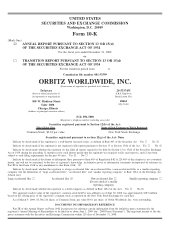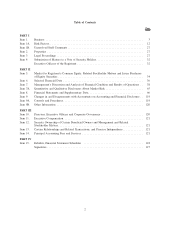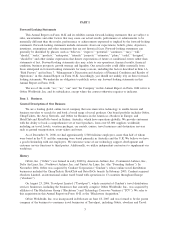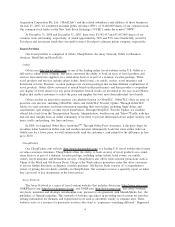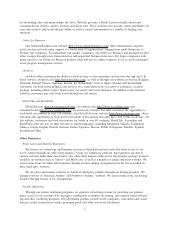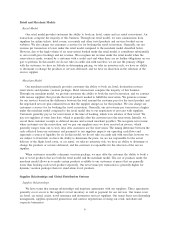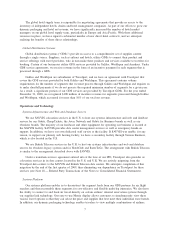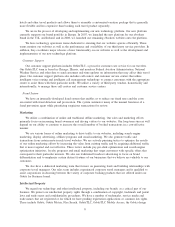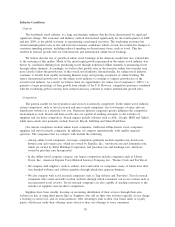Orbitz 2009 Annual Report Download - page 10
Download and view the complete annual report
Please find page 10 of the 2009 Orbitz annual report below. You can navigate through the pages in the report by either clicking on the pages listed below, or by using the keyword search tool below to find specific information within the annual report.Industry Conditions
General
The worldwide travel industry is a large and dynamic industry that has been characterized by rapid and
significant change. The economic and industry outlook deteriorated significantly for the fourth quarter of 2008
and into 2009, as the global economy is experiencing a prolonged recession. The weakening economy has
caused unemployment rates to rise and lowered consumer confidence which, in turn, has resulted in changes to
consumer spending patterns, including reduced spending on discretionary items, such as travel. This has
resulted in reduced growth rates for both domestic and international online travel bookings.
We believe that the rate of growth of online travel bookings in the domestic market has also reduced due
to the maturing of this market. Much of the initial rapid growth experienced in the online travel industry was
driven by consumers shifting from purchasing travel through traditional offline channels to purchasing travel
through online channels. Accordingly, we believe that growth rates in the domestic online travel market may
more closely follow the growth rates of the overall travel industry. Internationally, the online travel industry
continues to benefit from rapidly increasing Internet usage and growing acceptance of online booking. We
expect international growth rates for the online travel industry to continue to outpace growth rates of the
overall travel industry. As a result, we believe there are opportunities for online travel companies (“OTCs”) to
generate a larger percentage of their growth from outside of the U.S. However, competitive pressures combined
with the weakening global economy have reduced and may continue to reduce international growth rates.
Competition
The general market for travel products and services is intensely competitive. In the online travel industry,
certain competitors, such as travel research and meta-search companies, face low barriers of entry and can
launch new websites at a relatively low cost. Numerous Internet companies greatly influence the competitive
environment as well. Search and meta-search sites are capable of sending customers to the websites of
suppliers and our direct competitors. Search engines include websites such as AOL, Google, MSN and Yahoo!,
while meta-search sites primarily include Farecast, Kayak, SideStep and Yahoo!FareChase.
Our current competitors include online travel companies, traditional offline leisure travel companies,
suppliers and travel research companies. In addition, we compete internationally with smaller regional
operators. The companies that we compete with include the following:
• Among online travel companies, our major competitors primarily include expedia.com, hotels.com,
hotwire.com and venere.com, which are owned by Expedia, Inc.; travelocity.com and lastminute.com,
which are owned by Sabre Holdings Corporation; and priceline.com and bookings.com, which are
owned by priceline.com Incorporated.
• In the offline travel company category, our largest competitors include companies such as Liberty
Travel, Inc., American Express Travel Related Services Company, Inc., Thomas Cook and Tui Travel.
• We compete with suppliers, such as airlines, hotel and rental car companies, many of which have their
own branded websites and toll-free numbers through which they generate business.
• We also compete with travel research companies such as Trip Advisor and Travelzoo. Travel research
companies offer social networks on their websites through which consumers can access content such as
user-generated travel reviews. Travel research companies are also capable of sending customers to the
websites of suppliers and our direct competitors.
Suppliers have been steadily focusing on increasing distribution of their services through their own
websites in lieu of using third parties like us. Suppliers who sell on their own websites typically do not charge
a booking or service fee, and, in some instances, offer advantages such as their own bonus miles or loyalty
points, which may make their offerings more attractive than our offerings to some consumers.
10

